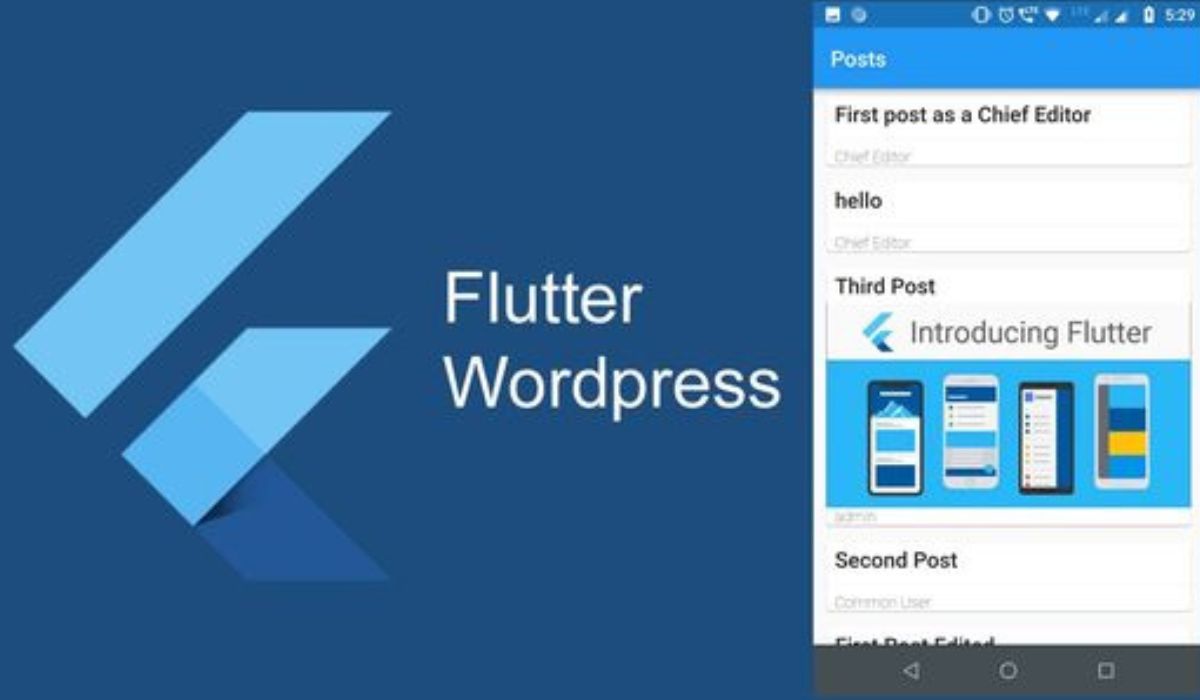Flutter is a robust platform used for app development, and WordPress is a popular CMS for managing websites. Flutter is an open-source UI software development toolkit that allows developers to create apps for mobile, web, and desktop using a single set of code. WordPress, on the other hand, is a flexible CMS for making webpages and blogs.
Understanding Flutter and Its Advantages
What is Flutter?
Google’s Flutter is a free and open-source user interface software development kit. From a single source of code, developers can make apps that run natively on mobile devices, the web, and desktop computers.
Key Features of Flutter
- Hot Reload: Flutter Hot Reload’s primary benefit is that it allows for instantaneous changes without requiring a full app restart.
- Expressive UI: Extensive collection of skinnable widgets for adaptive UI layout.
- Single Codebase: Multiple-Platform Support from a Single Codebase.
- Native Performance: Performance that is on par with native apps across all platforms.
Introduction to WordPress
What is WordPress?
WordPress is a popular CMS because it makes creating websites and blogs easier. It provides a wide variety of options for designing and administering websites.
Key Features of WordPress
- User-Friendly Interface: User-friendly interface that’s accessible even to seasoned pros.
- Customizability: Theme and plugin support for comprehensive personalization.
- SEO-Friendly: Built-in elements that improve indexability by search engines; SEO-friendly.
- Large Community: There is a sizable group of people working on and using this system.
Integrating Flutter with WordPress
Benefits of Integrating Flutter with WordPress
Combining Flutter and WordPress allows developers to make beautiful, functional apps that take advantage of the best features of both platforms. These advantages:
- Cross-Platform Compatibility: Create programs that run on several platforms while sharing a common set of code.
- Enhanced Performance: The combination of Flutter’s native performance and WordPress’s powerful capabilities results in improved performance.
- Cost-Effectiveness: Save money and effort on new projects by reusing old code.
Challenges and How to Overcome Them
- Learning Curve: There is a learning curve because developers need to learn how to use the Flutter and WordPress APIs.
- Compatibility Issues: Fixing incompatibilities between different releases of WordPress and Flutter.
Developing a Flutter App for WordPress
Setting Up a Flutter Project
- Install Flutter: To get Flutter up and running, grab the Flutter software development kit (SDK) and run the installation.
- Create a New Flutter Project: Use the command line to create a fresh Flutter project.
Implementing WordPress API in Flutter
- WordPress REST API: Learn the ins and outs of the WordPress REST API and where you can access it.
Authentication: Protect your WordPress database by using authentication.
- Retrieve Data: You can use the WordPress API to retrieve data such as posts, pages, or custom fields.
Designing the Flutter App Interface
- UI Design: Create an interesting user interface (UI) with Flutter’s modifiable widgets.
- Integrate WordPress Data: Put WordPress data on display in your Flutter app.
Deploying and Managing the Flutter App for WordPress
Choosing a Hosting Solution
- Select a Hosting Provider: Choosing a Web Host Find a dependable host that also works with Flutter apps.
- Deploy the App: App Deployment Entails Setting Up the Host and releasing the Flutter App.
Updating and Maintaining the App
- Regular Updates: Maintaining a steady stream of updates ensures that the app always has the most recent fixes and additions.
- Monitor Performance: Keep an eye on how well the app is doing, and use data analytics and user comments to make it even better.
Conclusion
The possibilities for both app developers and content creators expand greatly with the addition of Flutter to WordPress. Cross-platform compatibility, efficiency, and aesthetic appeal are all achievable by combining the best features of both platforms. In spite of the steep learning curve and compatibility issues, this integration offers a viable method for developing cutting-edge apps.
Frequently Ask Questions (FAQs)
Can I integrate Flutter with an existing WordPress website?
Using the WordPress REST API, the answer is yes, Flutter can be integrated with an existing WordPress site.
Is Flutter suitable for complex applications?
Yes! Flutter’s expressive UI and native performance make it a good fit for creating sophisticated apps.
Are there plugins available to integrate Flutter with WordPress?
While there aren’t any “official” plugins available just yet, developers can use the WordPress REST API to add support.
How does integrating Flutter with WordPress impact app development time?
By enabling code reuse between platforms, the integration of Flutter and WordPress can drastically save development times.
Can you recommend some well-liked Flutter packages for incorporating WordPress functions?
To make API calls, common packages include http and flutter_html, which renders HTML.











